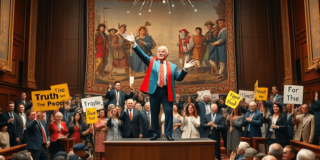
White nationalism is an ideology that seeks to organise political, social and cultural life around the asserted primacy of people identified as white, and it demands various forms of preferential status, exclusion or domination based on racial identity. This essay will argue that white nationalism is inherently dangerous and destructive by examining its historical consequences, its theoretical and moral flaws, its effects on individuals and societies, and the structural harms it produces when translated into policy or normalised in public discourse. It will also explore how white nationalist ideas spread and harden into movements that produce tangible violence and systemic injustice, and it will conclude by affirming the alternative values of pluralistic democracy, universal human rights and civic solidarity.
To begin, it is essential to define terms precisely in order to diagnose the threats posed by white nationalism. White nationalism is distinct from more general forms of racial prejudice in that it includes an organised political or social project aimed at maintaining or restoring a social order in which whiteness is the defining characteristic of full citizenship and belonging. Whereas racism can be expressed in individual attitudes or interpersonal behaviours, white nationalism envisions a society structured by racial exclusion, whether through formal segregation, ethnic cleansing, immigration restriction, or legal hierarchies that privilege one race. It frequently overlaps with the concept of white supremacy, which asserts the superiority of white people, but white nationalism is specifically oriented toward political claims and the remaking of institutions to secure a white-dominant polity. Understanding this distinction allows a clear appreciation of the forms of harm that the movement promotes and normalizes.
The historical record provides stark evidence of the consequences that flow from organising society around racial hierarchies and national myths of purity. Twentieth-century totalitarian regimes that rested on explicit racial doctrines, most notably Nazism in Germany, systematically implemented policies of exclusion, dispossession, and mass murder that culminated in the Holocaust. The racial ideology of the Nazi regime justified the industrialised extermination of millions of Jews, Roma, disabled people, and others whom the regime deemed racially or biologically unfit. This catastrophic outcome demonstrates the logical endpoint of a politics that dehumanises an entire category of people and mobilises state power to eliminate perceived threats. Similarly, colonial and settler societies often operated on principles that are materially indistinguishable from white nationalist doctrines; Indigenous peoples were dispossessed and subjected to violence precisely because white colonisers asserted racial and cultural superiority as grounds for domination and exclusion.
The twentieth century also offers more recent and regionally specific examples of white nationalist movements producing sustained harm. The system of apartheid in South Africa legally institutionalised racial separation and created enduring economic disparities and political repression that scarred the nation for generations. In the United States, organisations such as the Ku Klux Klan and other white supremacist groups have engaged in terror campaigns, lynchings and intimidation to enforce racial hierarchies long after the abolition of slavery. The legacy of segregation and discriminatory policies, including redlining and segregation in education, continues to shape patterns of inequality in wealth, health, and opportunity. These historical examples reveal an unmistakable pattern: when radicalised ideologies are permitted to structure public policy and social norms, the outcome is systemic injustice and often violent coercion.
Beyond the historical evidence, white nationalism is inherently dangerous because it rests on an erroneous and morally indefensible premise: that human beings can be meaningfully categorised into hierarchies of worth based on superficial phenotypic traits or imagined ancestral genealogies. Genetic science has discredited simplistic notions of race as a biologically determinative category. Human variation is continuous and cannot be cleanly divided into discrete races that map onto moral or intellectual capacities. Moreover, the moral philosophy that underpins modern human rights rejects the idea that any group has a monopoly on dignity, entitlement or moral consideration. To organise political communities around racially defined belonging is to contravene the egalitarian principle that all persons deserve equal moral respect. The injustice of white nationalism is therefore not merely pragmatic, but deeply moral: it is a denial of shared humanity based on arbitrary characteristics.
Psychologically, white nationalist ideologies produce corrosive effects both on the individuals who adopt them and on the broader social fabric. For adherents, these ideologies often gratify anxieties by offering simplistic explanations for complex social problems, scapegoating marginalised groups and offering an illusory sense of identity and belonging. Social psychologists have documented how in-group identification and out-group denomination can lead to moral disengagement, dehumanisation, and justification of violence. Radicalisation processes that draw people into white nationalist networks exploit grievances, real or imagined, and transform personal discontent into collective aggression. For those targeted by white nationalism, the psychological toll is profound; exposure to threats, discrimination, and exclusion produces trauma, fear, and a pervasive sense of insecurity that undermines well-being across generations.
At a structural level, white nationalist policy proposals and political strategies produce damaging consequences for democracy, social stability, and economic prosperity. Policies that exclude certain groups from citizenship, voting rights, or equal protection under the law undermine the foundational principles of democratic governance. When a polity enacts laws that privilege one group and disenfranchise others, it forfeits the legitimacy that is derived from consent and equal representation. Such regimes tend to concentrate power in ways that reduce transparency and accountability, creating opportunities for corruption and abuse. Economically, exclusionary policies reduce the productive capacity of societies by limiting access to education, employment, and markets for whole segments of the population, thereby squandering human capital and inhibiting innovation. History makes clear that open, inclusive societies are more resilient and dynamic, whereas closed and exclusionary regimes suffer stagnation and internal strife.
White nationalism also corrodes public discourse and civic norms by normalising hatred and intolerance. When mainstream political actors or media platforms provide space for white nationalist narratives, they contribute to an environment in which inflammatory language and dehumanising metaphors become acceptable. This normalisation has a multiplier effect; it lowers the barriers to more extreme expressions, facilitates recruitment into extremist networks, and delegitimises voices that advocate for pluralism and equality. The social media era has allowed white nationalist ideas to spread rapidly, often through coded language and the reuse of symbols that carry violent connotations. The amplification of such content not only emboldens extremists but also shapes the perceptions of individuals who may never directly interact with organised movements, thereby altering the cultural climate in ways that make exclusionary policies politically feasible.
The link between white nationalist ideology and physical violence is not merely theoretical. In the contemporary era, several high-profile acts of mass violence have been perpetrated by individuals motivated by white supremacist or white nationalist beliefs. These attacks, whether directed at houses of worship, minority communities, or political gatherings, have inflicted deep loss and terrorised communities. The perpetrators have often claimed ideological justification in manifestos or social media postings that draw explicitly on white nationalist doctrines. Such violent manifestations demonstrate that white nationalism is not merely an abstract philosophy but sometimes a direct impetus for organised or semi-organised violence. When an ideology that dehumanises others is allowed to flourish, it becomes easier for violent actors to rationalize atrocities as necessary acts of defence or restoration.
Moreover, white nationalism is destructive because it promotes division and undermines the social solidarity required to respond to shared challenges. Modern societies face complex, transnational problems such as pandemics, climate change, economic inequality, and global economic interdependence, which require cooperation across lines of difference. An ideology that casts fellow citizens as outsiders or enemies on the basis of race inhibits the formation of coalitions that are necessary for effective policy responses. It corrodes trust in public institutions and in the social bonds that make collective action possible. When trust breaks down and polarisation intensifies, governance becomes more fraught and less capable of producing just and effective outcomes, thereby amplifying the vulnerabilities that white nationalism purports to address.
Another dimension of the danger inherent in white nationalism lies in its capacity to distort historical memory and civic education. White nationalist narratives often rely on mythic reconstructions of the past, presenting sanitised or glorified versions of national histories that erase the suffering of marginalised peoples and valorise exclusionary identities. This selective memory undermines critical engagement with historical injustices and prevents societies from learning the lessons necessary to avoid repeating past mistakes. Education that is shaped by revisionist or exclusionary agendas deprives future generations of a comprehensive civic literacy and fosters prejudices that can be transmitted intergenerationally. In this way, the ideological damage of white nationalism can persist long after specific organisations have faded.
The ideological claims of white nationalism also fail on pragmatic grounds when tested against empirical realities. Societies that have embraced pluralism and multicultural inclusion often experience greater economic dynamism, cultural creativity, and international legitimacy. Immigration, when properly managed, has historically been a driver of innovation and growth, contributing to labour markets and the replenishment of skills and talents. Attempts to insulate a nation through ethnoracial purity often result in demographic decline, labour shortages, and economic isolation. In the international arena, countries that adopt exclusionary policies risk diplomatic isolation and the erosion of soft power, which can have long-term strategic costs. The allure of a mythic past in which a singular identity supposedly guaranteed social cohesion is undermined by the practical reality that diverse societies have repeatedly demonstrated their capacity for coexistence and mutual benefit.
Critically, white nationalist ideologies often instrumentally appeal to anxieties about cultural change, economic insecurity, and perceived loss of status. While these anxieties deserve empathetic and evidence-based policy responses, white nationalism offers no sustainable solutions and instead channels legitimate grievances into scapegoating and xenophobia. Effective public policy should address the roots of economic dislocation, provide social safety nets, support education and retraining, and foster inclusive civic institutions that ensure all citizens have a voice. When democratic leaders choose to weaponize identity for political gain rather than proposing substantive policies, they deepen social fractures and inhibit the formation of durable, inclusive solutions. Thus, the danger of white nationalism is not merely its content but also the political logic that encourages short-term exploitation of fear at the expense of long-term social health.
It is also important to recognise the international dimensions of white nationalist movements, as these ideologies do not operate in isolation within national borders. Transnational networks of white nationalists share resources, strategies, and propaganda, and they often coordinate online to amplify their messages. This cross-border connectivity facilitates the diffusion of extremist tactics and can contribute to synchronous spikes in hate crimes and violence in multiple jurisdictions. Moreover, white nationalist movements in one country can embolden or inspire copycat actors elsewhere, generating waves of instability that transcend national sovereignty. The global spread of these ideas complicates counter-extremism efforts and underscores the need for international cooperation in monitoring, prevention, and the promotion of alternative narratives that emphasise common humanity.
From a legal and governance perspective, the rise of white nationalism presents difficult challenges for liberal democracies that must balance commitments to free expression with the need to protect citizens from harmful speech and organised violence. Democracies that fail to enforce anti-discrimination laws, to hold accountable those who incite violence, or to curb the flow of extremist propaganda endanger vulnerable communities and degrade the rule of law. However, robust responses must also be principled and rights-respecting; overbroad censorship or indiscriminate repression can backfire, driving movements underground and reinforcing martyrdom narratives that extremist groups exploit. The appropriate response requires a combination of targeted law enforcement against criminal acts, transparent legal frameworks that protect civil liberties, and proactive social strategies that inoculate communities against radicalisation.
Understanding the conditions under which individuals are drawn into white nationalist movements is crucial for designing effective prevention strategies. Research on radicalisation indicates that social isolation, identity crises, exposure to echo chambers, and charismatic recruiters are common enabling factors. Interventions that offer alternative sources of belonging, mentorship, and critical thinking skills can be effective in steering susceptible individuals away from extremism. Educational curricula that emphasise media literacy, civic engagement, and the ethical responsibilities of citizenship contribute to resilience against extremist narratives. Community-based programs that foster cross-cultural dialogue and shared projects can rebuild trust and demonstrate the practical benefits of pluralism. In these ways, societies can reduce the appeal of divisive ideologies by addressing both the supply of extremist narratives and the demand for them.
The moral urgency of resisting white nationalism also stems from the intergenerational consequences of such an ideology. Policies and cultural practices that institutionalise exclusion not only harm contemporary victims, but also entrench inequalities that persist across generations. Educational deficits, concentrated poverty, and health disparities that arise from discriminatory institutions create cycles of disadvantage that are difficult to reverse. The long-term moral obligation of a just society is to dismantle structures that perpetuate harm and to create conditions in which all children have equitable opportunities to flourish. White nationalism, by contrast, seeks to perpetuate hierarchies that make such equitable conditions impossible, thereby condemning future generations to avoidable suffering.
Finally, rejecting white nationalism is not merely a defensive act to prevent harm; it is an affirmative commitment to values that enrich human life. Embracing pluralism, equality, and mutual respect opens societies to the full range of human creativity, fosters more robust public deliberation, and enables the forging of solidarities that can respond to common threats. Cultures that celebrate diversity are better positioned to learn from one another, to innovate, and to craft inclusive policies that reflect the dignity of all persons. The strength of democratic institutions resides not in homogeneity but in the capacity to manage diversity through fair procedures, to protect minority rights, and to cultivate a shared civic identity that transcends narrow claims of inherited privilege.
In conclusion, white nationalism is inherently dangerous and destructive because it rests on morally indefensible principles, has a documented history of producing violence and systemic injustice, corrodes the psychological well-being of individuals and communities, undermines democratic governance and economic prosperity, and fosters international networks of extremism that complicate global peace and security. The ideology’s appeal to fear and false nostalgia cannot justify the tangible harms it inflicts. Effective responses require a combination of law enforcement against criminal acts, education and prevention efforts that build social resilience, and political leadership that advances inclusive policies. Most importantly, societies must reaffirm the ethical commitments to equal dignity and mutual respect that undergird democratic life. To allow radicalised doctrines of exclusion to take root is to gamble with the most essential elements of justice and stability, and to fail in the fundamental duty of politics, which is to secure the flourishing of all members of the community.



